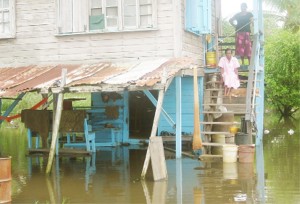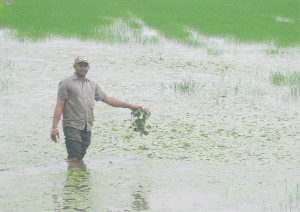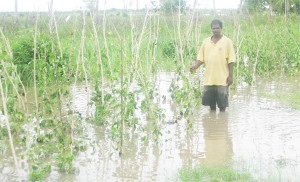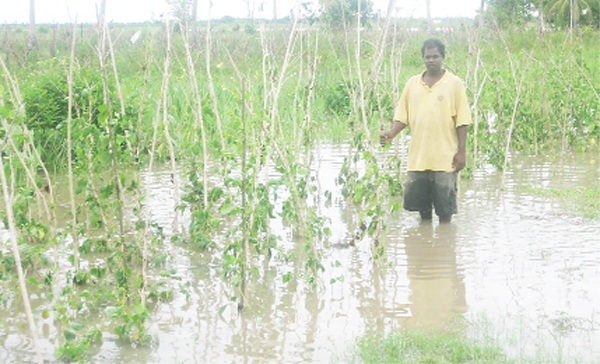Story and photos by Shabna Ullah
With floodwater on their land for about one week, residents of Black Bush Polder are distressed over excessive losses of rice and cash crops and were praying yesterday for the stagnant water to recede.

The residents of the four polders at Lesbeholden, Johanna, Mibicuri and Yakusari who earn their livelihoods from rice and cash crop farming told this newspaper during a visit yesterday that “in a long time this place never flood so much.”
They pointed out that the floodwaters were on their land since the heavy rainfall started last Wednesday and “the water taking really long to come off the land and maybe that is because of poor drainage… or the water coming from the savannah. We hear that the dams in the area have about 18 breaches…”

The residents said the only way to stop the flooding in the polders is to get a “return pump” to drain and irrigate the area. They said that at present, the pump at Manarbisi only irrigates the canal “but when the floods come the pump should be used the other way to drain the water.”
Asked about the water not receding fast enough, Regional Chairman Zulfikar Mustapha told Stabroek News yesterday that “all the [drainage] systems are intact.”

He said the flooding was because of the excessive rainfall and pointed out that for one night alone there was eight inches of rainfall. The chairman said too the since the flooding started on Christmas Eve he has been in the polder everyday monitoring the situation.
At Mibicuri, a farmer, Mahendra Boodhoo who was wading through their flooded street with his wife and baby said he was going to New Amsterdam to spend a few days with his sister to escape the flooding.
He had already lifted his two other children, aged four and five years old, to a relative’s house on “the road” where they would get dressed before continuing their journey.
He told this newspaper that after the flood started he spent two days trying to pump the water out of his farm where he planted 200 roots beans, 50 root cassava, 30 roots papaya, catahar and squash. He said after the water kept rising, he decided to give up.
Rafeek Mohamed said he was pumping water for three days in an effort to save his 4,000 roots cabbage, 1,000 roots tomato and 1,000 roots pepper. “But the water keep rising all the time so me get bruk mind to pump because when me wake up morning-time the water still full back in the garden.”
He said he invested a lot in his farm and was sad that the tomatoes were “in bearing stage” while the peppers were small when the floods came. He said he only sold a few cabbages from his farm.
Rice farmers, Dipnarine, Ravilall Hemlall and Mangal Sookram who invested in several acres of rice land at Mibicuri less than a month ago said that their fields are inundated and were contemplating “what to do now.”
They said they could not “pump the water out because the water don’t have anywhere to go.”
Dipnarine, also a cash crop farmer whose 2,000 roots boulanger and 1,000 roots ochro are under water was still counting his losses. He said though that he invested about $350,000 in his 15-acre rice crop, while Hemlall said he spent over $2.5 million in his 75-acre crop.
A rice farmer of Lesbeholden, Ganesh Bisham told this newspaper yesterday that he invested in 96 acres of rice and so far “40 acres already flood out clean; it can’t come back. If me pump the water don’t have anywhere to go.”
His crops are also under threat from “snails, water weevils and duck-weed.” He said the duck-weeds are sometimes under the rice in the field but would not affect the crop too much “but when the fields flood the duck-weed would float up and cover the rice and take over the field.”
His son, Tiwari Bisham lost his 300 roots of karilla but he had picked three times already from the cultivation.
Ronald Jainarine, a cash crop farmer told this newspaper that he watched helplessly as the water covered his farm where he grew one and a half beds of peppers, one bed karilla, 2 beds squash, two beds ochro and one bed of cassava.
The father of six said most of his produce was about to start “bearing. That is all me does depend on and when the water go down me have to find money to buy seeds and to develop the land again.”
His son, Michael Jairam whose farm is located opposite said he was in the process of reaping but has lost a bed each of squash, peppers, pumpkin and karilla. He said he tried to build the beds up but “the water come extremely high.”
In recent times he never experienced that amount of water in his farm. He recalled that the last time the area was flooded to that extend was in 1995 but “that time the water was draining off the land fast.”
Michael who estimated his loss to be $600,000 said he was hoping to catch the price for his crop “after the holiday season when the [sugar] factory starts to grind and when everything [sales] does be back to normal.”
His uncle, Patrick Jainarine’s cash crop farm – two beds each of squash, ochro and beans — has also been destroyed. He said government officials have dubbed “Black Bush the bread basket of the country so we would like them to bring seeds, drugs and hampers to assist the farmers in here.”
He also called for “persons who can afford to give we some help so we can start again.”
Another farmer, Mangal who lost his two beds of bora and one bed each of squash, muskmelon, and cucumber said it was “reaping time for me.”
He said “this situation telling me to leave this place but at my age where I would leave and go?”
Narine, 36, a single father of six children aged seven to 16 years old said it was not easy to invest in his farm and “watch everything go. Me don’t know what me must do now.”
Satnarine Seecharran and his wife, Jenny told this newspaper that they have lost two beds of peppers, muskmelon and squash, 1,000 roots of peppers that were planted one month ago and one bed of bananas.
The Seecharrans who have three sons at primary school said that they spent a lot of money to invest in their crop and were distressed.
They said that their fowls do not have anywhere to go but they have raised the inside of the pen higher while although the ducks are enjoying the water they could catch cramps and die. They said too that at nights they have to lift their goats on the tables to sleep.
Jenny, a teacher at Corentyne Comprehensive High and a student of the University of Guyana said that she has had to move her washing machine out of the floodwaters from the lower flat of their home.
An 86-year-old resident, Pulmattie Kunchbeharry was sitting on her stairs watching the floodwaters and wondering how long more it would remain in her yard.
The woman who said she has to “wear me long boots to go to the toilet [pit latrine]” told this newspaper “me live in this area since 1961 and we used to get a little flood and the water used to move fast but we never had it like this” referring to the stagnant water.
She said too, “Awe dey over mark bad and me want to see what the government can do fuh we.” She said after the flood started she called her daughters on other parts of the Corentyne and told them she wanted to go stay with them but their villages too were inundated.
Her daughter-in-law, Sunita Kunchbeharry said that she had to abandon her kitchen in her lower flat and gave it to the fowls to stay. She said four of her fowls that were under the house died “because the water raise and they left there.”

